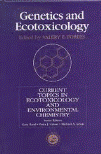Papers in the Biological Sciences

Valery Forbes Publications
Document Type
Article
Date of this Version
1998
Abstract
The importance of dissolved versus sediment-bound cadmium as uptake routes for the deposit-feeding polychaete Capitella species I and the toxicity and toxicokinetics of cadmium from these exposure routes were investigated. Effects were reported as changes in worm growth rate, egestion rate and allometry. Radioactive cadmium (109Cd) was used as a tracer to examine the uptake (5 d) and subsequent depuration (6 d) of cadmium. Both effects and kinetics were investigated in systems with and without sediment. Individual Capitella sp. I were exposed to (1) dissolved (i.e. –1). Worms in water-only treatments showed negative growth rates, which decreased linearly from –5 to –10% d–1 with increasing cadmium concentration. Cadmium had no detectable effect on egestion rate or growth in the presence of sediment in either sediment-bound only (ca 36% d–1) or porewater & sediment (ca 30% d–1) treatments. Cadmium exposure had no detectable effect on the allometric exponent (i. e. area-length relation) in any of the treatments; however, worms in water-only treatments were relatively thinner than in the 2 treatments with sediment. Worms in porewater & sediment treatments took up ca 50-fold more cadmium (ca 195 ng Cd worm–1) than worms in water-only treatments (3.9 ng Cd worm–1) during 5 d of exposure. Sediment-bound cadmium was calculated to contribute 95 % of the total amount taken up by feeding worms. Starving worms retained all of the cadmium during the subsequent depuration period (6 d), and exhibited an increased weight-specific body burden (μg Cd g–1 dry wt worm) due to shrinkage. In feeding worms, the decrease in weight-specific body burden was faster (T½ = 3 d) than the decrease in total body burden (μg Cd worm–1; T½ = 11 d), indicating that both active excretion and dilution of cadmium body burden as a result of growth contributed to the change in cadmium tissue concentration during the depuration period. Thus, our results indicate that in Capitella sp. I sediment-bound cadmium is the major route of uptake. We found that cadmium affects starving but not fed worms, despite the fact that fed worms took up considerably more cadmium than starving worms. Our results suggest that stress associated with food limitation increases the susceptibility of worms to cadmium stress.


Comments
Published in MARINE ECOLOGY PROGRESS SERIES 164 (April 9, 1998), pp. 167-178. Copyright 1998 Inter-Research. Used by permission.